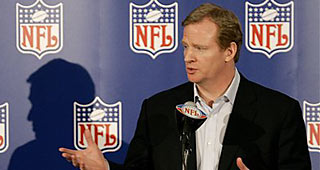If the three-week disaster that was the NFL’s experiment with replacement referees has taught us anything, it’s that Roger Goodell was never the “most powerful man in sports”. Just as the replacement refs were essentially substitute teachers who could not maintain order in the classroom, Goodell can be similarly understood through a school house metaphor.
The commissioner is the Assistant Principal of the NFL, responsible for disciplining employees but without any real power when it comes to the actual running of the organization. Goodell may have near dictatorial authority when it comes to player suspensions, but he has no real leverage on the people who sign his paychecks, the league’s 32 owners.
The all-powerful commissioner is a relic of the day when sports leagues were essentially family operations, with owners worried as much about growing the game as their profit margins. In 2012, all four professional sports leagues are mature businesses, with owners who have invested hundreds of millions of dollars and are avidly watching their individual bottom lines.
As a result, the commissioner of a major American sports leagues has become an increasingly thankless job. Goodell, David Stern, Gary Bettman and Bud Selig -- none of the four has exactly covered himself in glory over the last decade. The problem isn’t so much the men who hold the office as it is the office itself.
A commissioner, like an assistant principal, has a lot of tools at his disposal to monitor and control player behavior. Indeed, Stern and Goodell’s offices spend a lot of time enforcing their league’s respective dress codes, making sure that everyone’s socks and shirts are just so. And if any of their players get arrested or involved in off-the-field discretions, they have a broad series of powers to protect the reputation of the game.
However, in the modern era, the owners are the ones doing the most damage to their sports, and there’s precious little a commissioner can do to punish them. As a result, Goodell and his ilk have become the public face of a two-tiered system of justice, where players get the book thrown at them for any misconduct while owners don’t get a slap on the wrist or even a wag of the finger for even the most grievous of offenses.
Shahid Khan, the newest NFL owner, purchased the Jacksonville Jaguars for $750 million in 2011. Goodell can advise him and the league’s 31 other owners about the best course of action, but the power differential in their relationship is obvious. Goodell wasn’t elected commissioner until the fifth ballot, and if he had wanted to end the referee lockout without the owner's consent, it wouldn’t have been very hard to replace him.
In many ways, the most important role a commissioner can fill is as human shield, an empty suit to be placed between the owners and public outrage whenever necessary. If the NFL owners decide to lock out the referees out of “principle”, jeopardizing the integrity of the games in order to win a fairly trivial labor dispute, Goodell gets the blame. And if an NBA owner decides to break his lease and move his team, Stern gets the blame for that.
Goodell, a self-righteous bully who doesn’t exactly have charisma oozing from every pore, was a perfect choice to fill the new breed of commissioners. As has become yearly tradition with Bettman and Stern, he will likely be booed heartily during next year’s NFL Draft. That, more than anything else, is why the NFL’s owners have no problem writing a $10 million check to a glorified hall monitor.

Jonathan Tjarks wrote on the NBA for RealGM from 2011-2016 before joining The Ringer.
Follow @JonathanTjarks on Twitter.


